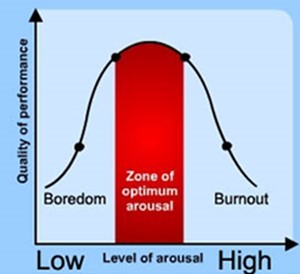
A few weeks ago I was speaking to a flight attendant on my way home from San Diego. Everyone copes with stress differently, so, when I asked if her job was stressful, I was surprised when she told me she wasn't fazed by the quick turnarounds or difficult hours. Instead she said: "I LOVE this job. I would do this job for no pay. I like people and get to hang out with new and interesting people every day." (Obviously someone who was terrified of flying or who was painfully shy probably wouldn't feel the same way.) And that's why it's hard to predict what job is going to be stressful and what job isn't. It depends on the person in the job.
For a shy retiring type, working in the stacks at a library just might be perfect. But for the gregarious person, who wants to be with people and likes going places, the librarian's job would be just as stressful to her as the flight attendant's job would be for the librarian.
There's no doubt that we all have a stress profile, and your job has a stress profile too (whether that means lots of deadlines, working with lots of people, endless meetings, squabbles with coworkers, or something quite the opposite) and the two need to match up to some extent. (How resilient are you? Can you handle the stress associated with the job?) For people who are working in the food service business, the commonly used expression "If you can't handle the heat, get out of the kitchen," explains how this concept works to a tee. Obviously a chef or a short-order cook who isn't very adept at handling the stress of multiple over-lapping deadlines, lots of complaints, and standing all day in a hot kitchen, probably needs to think about finding a different career. This job requires a person with a highly resilient stress profile.
I actually met a former chef who spoke at a gathering of ISMA (The International Stress Management Association) in Chicago several years ago. He initially loved his job, but he didn't like all the stress. Over the ten years he was a chef, he started developing symptoms of M.S. As the restaurant got more and more popular, his symptoms got worse and worse. It was getting to the point where it was difficult for him to walk and to stand for long periods of time. When he spilled a 10-gallon pot of boiling water all over himself, he knew it was time to quit. He eventually wound up in a wheel chair completely unable to walk.
That's when he discovered stress management. He found a job a with a completely different stress profile and by adding in a low fat diet, meditation and other forms of stress management completely recovered his ability to walk. I remember going out on the town with him after his presentation, he walked so well, I completely forgot he had MS. It was remarkable.
So how do we decide how much job stress is the right amount of stress for us? And how can we tell when some stress is too much? How do we know what careers we're well adapted for and which ones we aren't?

The Yerkes-Dodson optimal performance curve.
Take a look at the above graph. This graph is known as the Yerkes-Dodson, Optimal Performance Curve. It shows that as your levels of stress or arousal increase, your productivity increases also, but only to a certain point. When you have too little stress, your job is boring, not challenging enough. When you have too much stress, your job is overwhelming and unpleasant and eventually leads to burnout and or illness. (The chef in the above at example had reached the right hand side of the curve.)
But you are not looking for a job with zero stress, either. That would be dreary and dull, and possibly even mind-numbing. What you want to have is a job with some stress in it. The right amount of stress for you. And that's different for everyone depending on their own individual stress profile. To find out what your stress profile is check out our online stress test - you can take it by signing up for a one month trial here, then clicking on The Stress Profiler.